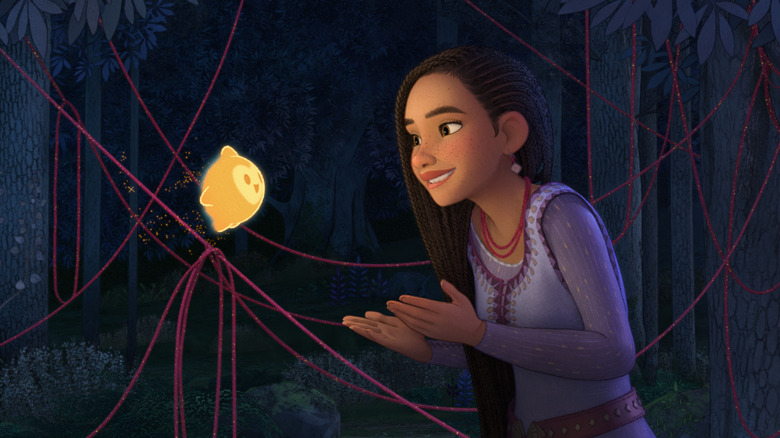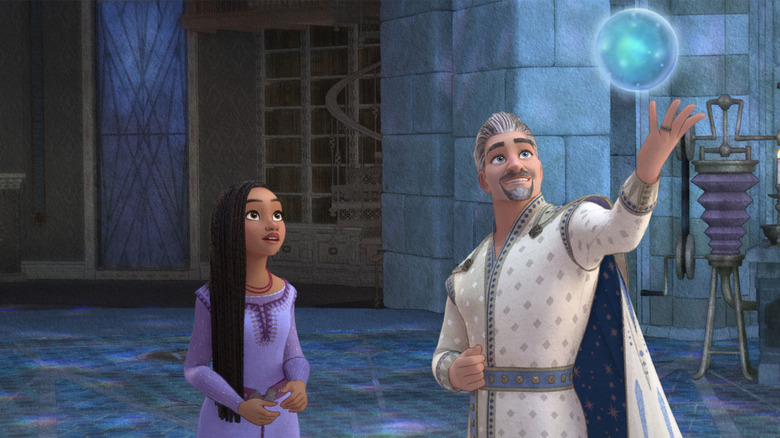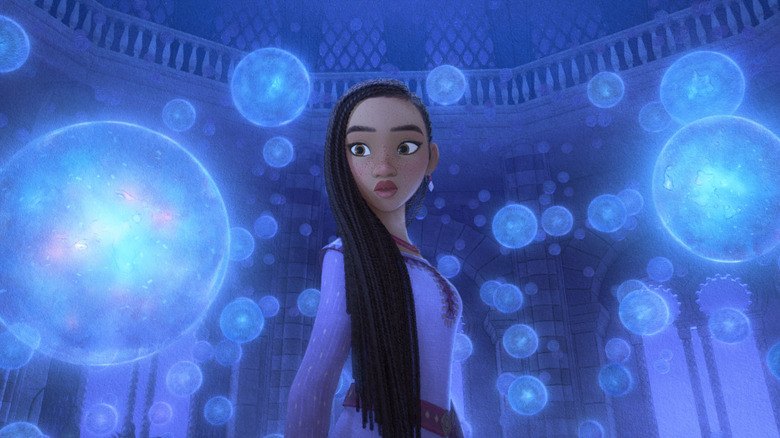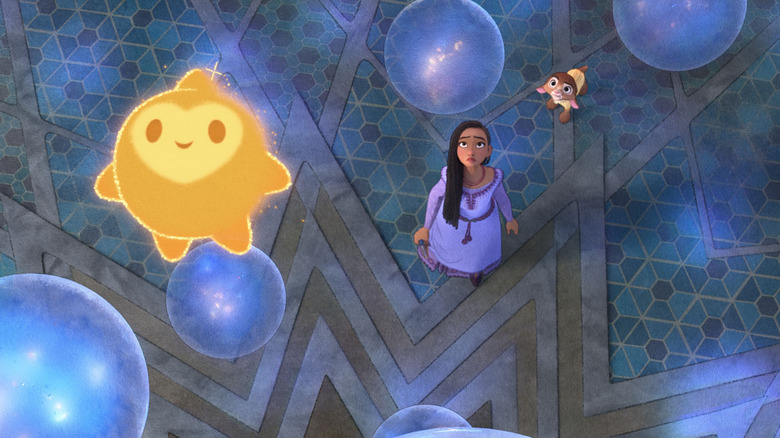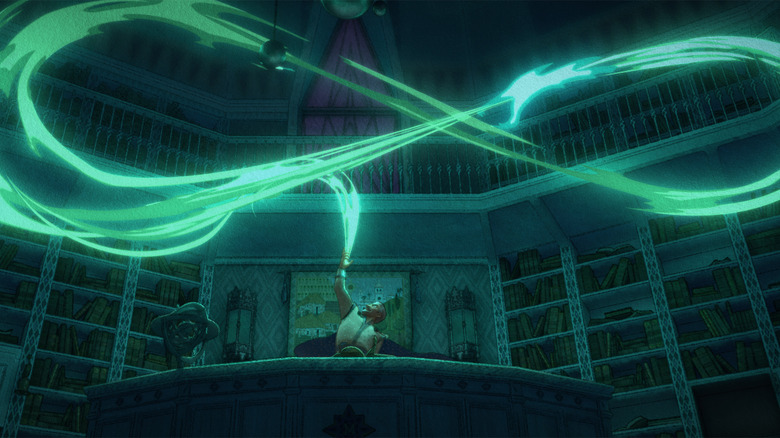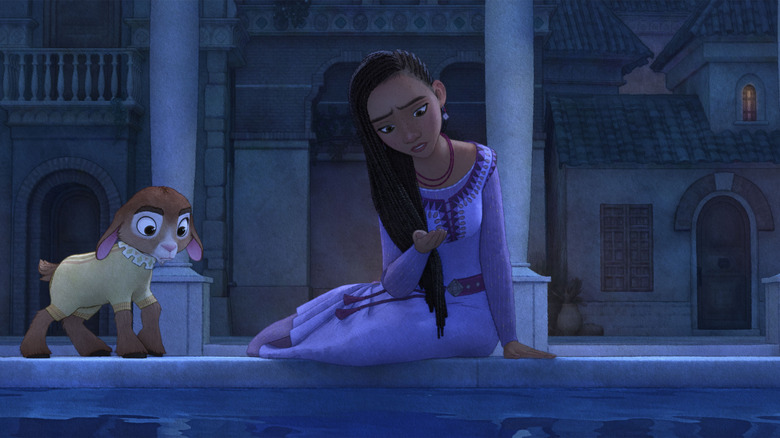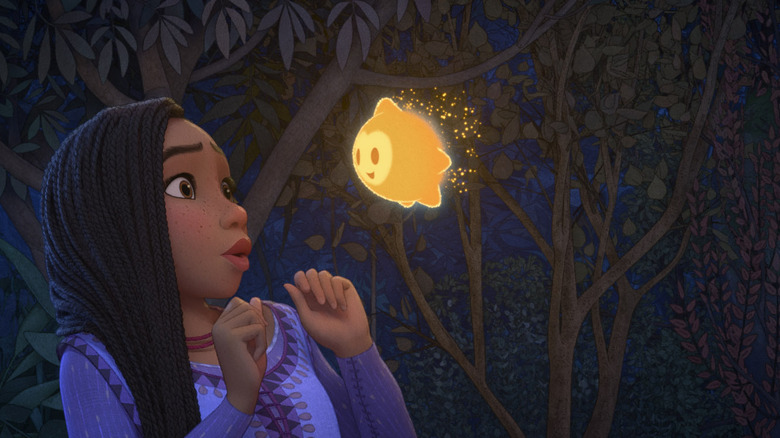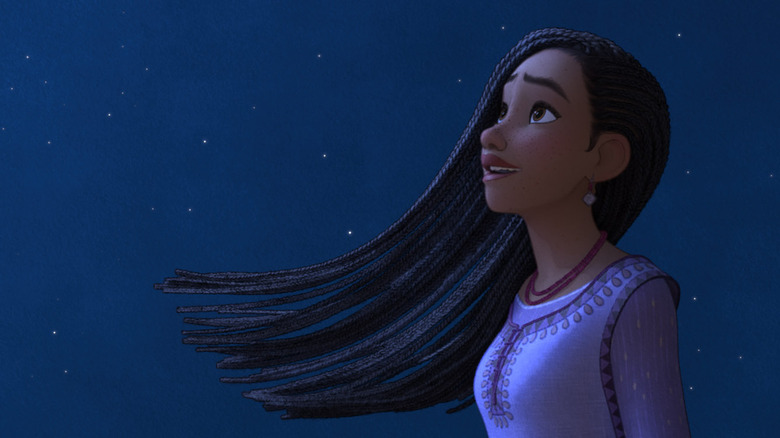Wish Ending Explained: As Dreamers Do
If there's a constant, all-encompassing rule to the universe, it's that absolutely nothing is built to last. If all matter is doomed to the inescapable fate of entropy, and every living thing eventually dies, then what hope do such lovely intangibles as love, desire, and dreams have?
Well, to quote that ersatz Disney prince, Vision, "a thing isn't beautiful because it lasts." Love, dreams, and wishes are beautiful almost because of the fact that they can't always come true; it's the hope, the having of these wishes, that makes life worth living more than merely the attainment of them. Walt Disney and the studio that still bears his name have been a proponent of this principle for Disney (the man's) entire life and Disney (the studio's) existence to date. And now that the studio has reached the milestone of sticking around for 100 years, it's only natural that they'd wish to celebrate such an anniversary with a victory lap of an original feature.
"Wish," directed by Chris Buck and Fawn Veerasunthorn, is that feature, a movie stuffed to the cauldron's brim with Easter eggs and various references to Disney's remarkably successful past. Yet the directors and their writing team (Jennifer Lee, Allison Moore, Carlos López Estrada, and Andrew Rothschild) have fashioned a film that not only stands on its own but seeks to address some of the real-world issues now facing the studio and its attendant companies. To wit: Wishes and dreams are not for the greedy to hoard — but a (hopefully) benevolent entity with the power to grant some of them can't hurt.
The sorcerer's apprent-ish
Beginning, naturally, with an introduction via a storybook and a narrator, the fairytale of "Wish" begins in the kingdom of Rosas, a land founded by King Magnifico (Chris Pine) and Queen Amaya (Angelique Cabral) on an island in the Mediterranean Sea. Due to Magnifico obsessively learning magic in order to make manifest people's deepest wishes and then potentially grant them, he and Amaya have established a system on Rosas wherein the populace give over their wishes to the king for safe keeping on their 18th birthday, and then during the king's monthly ceremony, one lucky citizen is chosen to have their wish granted.
Asha (Ariana DeBose), a 17-year-old girl who adores her family and excitedly greets newcomers to Rosas, is especially hopeful that her 100-year-old grandfather, Sabino (Victor Garber), will have his wish granted during this month's ceremony. She's also landed a prestigious job interview with Magnifico, where she may get the chance to become the king's apprentice. After getting some tips from her friends Dahlia (Jennifer Kumiyama), Gabo (Harvey Guillén), Hal (Niko Vargas), Simon (Evan Peters), Safi (Ramy Youssef), Dario (Jon Rudnitsky), and Bazeema (Della Saba) — all of whom bear a resemblance to the Seven Dwarfs — Asha attends her interview.
At first, she and Magnifico bond over the beauty of all the wishes that the king keeps inside his secret chamber, and Asha gets to see Saba's wish inside its bubble, which is to create a piece of music that will inspire others. Upon making the remark that she hopes the king will consider Saba at the ceremony, however, Magnifico becomes incensed, leading to an argument where Asha voices concern over the fact that the king erases people's memories of their wish as soon as they're given to him; in the king's mind, this relieves people of the burden of hope and following their dreams, but Asha sees this as the insidious soul-robbing that it is.
This wish, this wish — unstoppable
Despite their fundamental disagreement, Magnifico insists that Asha sit by him during the wish ceremony, meaning that perhaps not all hope is lost for her to get the gig. Sadly, this turns out to be just another manipulation by the silver-tongued king, as he makes a point of choosing someone else other than Saba during the ceremony before telling Asha to her face that she's lost the job.
Although Asha attempts to tell her family about Magnifico's true nature, they refuse to believe her. Furthermore, Saba admonishes her offer of the truth, believing that knowing what his wish is without ever having the chance to pursue it would be more harmful than good. Heartbroken, Asha wanders the streets of Rosas thinking of all the wishes that the people have freely given up and may never see or get back. It's this that causes her to finally make her heart's deepest wish, that she be able to find a way to help the people of Rosas find their wishes, if not achieve them. Asha's wish is so heartfelt and powerful that it summons a special cosmic force to come down out of the sky, a being aptly named Star. Asha immediately sees Star's presence as a blessing, as the little star's stardust is able to bring the gift of speech to just about every woodland creature, including Asha's pet goat, Valentino (Alan Tudyk).
While the citizens of Rosas all seem to sense Star's arrival and inherently know it to be a force for good, Magnifico interprets the presence as threatening. The king sees wishes and desire as the first step on the road to unchecked greed, due in large part to his family falling prey to thieves who burned down their village when he was young. What's more, Magnifico believes that Star's presence is indicative of a rival sorcerer coming to take what's his, which leads him to break his vow never to study dark magic.
Feeling heist-y
Now emboldened with her new companion, Asha sneaks Star into Rosas in the hopes of trying to break Magnifico's iron rule over the town's wishes. Revealing Star to Dahlia and her pals, the group comes up with a plan to break into Magnifico's secret chamber and steal back Saba's wish as well as the wish made by Asha's mother, Sakina (Natasha Rothwell). In order for Asha, Star, and some of the others to sneak in, they entrust Dahlia (who is having to cast aside her long-standing crush on the king) with distracting Magnifico somehow.
Dahlia's plan ends up working a little too well. During a town gathering mandated by the king, Magnifico begins making demands of the citizens to inform him about any and all mysterious goings on. When Dahlia, by way of keeping Magnifico occupied, begins asking questions of the king and his policies, other citizens of Rosas are inspired to ask their own questions, too. Just as a revolution seems about to foment, the king pulls his Ace, telling the citizens that he'll gladly grant the wish of anyone who turns in the traitor ... and that he'll make sure to never grant the wishes of anyone who may be helping them.
Running out of time, Asha and Star are only able to find and rescue Saba's wish, fleeing the castle just as Magnifico sinks deeper into his book of dark magic.
Selling out and staff-ing up
Asha rushes back to her home to give Saba his wish back, something that he happily accepts by re-absorbing the wish back into himself. Shortly after being made whole, however, Magnifico arrives, having been informed by someone that Asha is the traitor and it is she who has brought Star to Rosas. In retaliation, Magnifico reveals that he's brought Sakina's wish with him, and crushes it right in front of her. Not only is Sakina wounded at this loss, but Magnifico discovers that crushing wishes can grant his dark magic even greater power.
Asha, Saba, and Sakina manage to flee to safety, headed for a secluded nearby island. However, Asha, Star, and Valentino decide to return to Rosas to try and save the kingdom. After Simon is revealed as the informant who told on Asha, Magnifico publicly grants Simon's wish, with a twist — the king turns him into a knight as he'd wished, but also makes him a brainwashed pawn who's ordered to hunt Asha and Star down. In order to gain greater power, Magnifico crushes more wishes (especially those of the citizens who dared to question him), building a new magic staff as a result.
Seeing this irreversible change happening to her husband, Queen Amaya is moved to join the cause of Asha's revolution (helped along by a stardust-enhanced mouse whispering a message from Asha in her ear, an allusion to a few Disney characters and films, chief amongst them Mickey Mouse, "Cinderella," and "Ratatouille"). With her seven (now six) friends and the Queen, Asha decides to try and free all the wishes kept hostage by the now evil king.
Ya no hay estrellas
Seeing as how it mostly worked earlier, Asha and pals decide to pull another bait-and-switch heist again, with Asha using herself as the bait while Star and the others open up the giant dome at the top of Magnifico's secret chamber to free all the wish bubbles. The plan seems to go smoothly, as Asha leads Magnifico on a merry chase through the nearby forest while Gabo and his friends attempt to coordinate their efforts in order to open the chamber roof.
Unfortunately, it seems Magnifico can do a bait-and-switch too, as it's revealed that the Magnifico chasing Asha in the forest was actually Simon in magical disguise. Although Asha tries to book it back to the castle to warn her friends (accepting a little help from her new talking woodland creature pals in order to distract Simon), she's too late: Magnifico uses his new powers to sap the strength of all the wishes of the people of Rosas, captures Star inside his staff, and blocks out the entire sky, removing the stars from the people's view so that no one may make a wish on any of them again.
We are all made of stars
Pitting her own nascent magic against Magnifico proves to be too tough a battle for Asha alone, as she's nearly defeated by the king's newfound evil powers. However, she intuits where she can find the strength to defeat his dark power, remembering that Star and her woodland creature friends showed her how every living being is made from stardust, which means that everyone has a little bit of the same wishful power Star has. Calling on the people of Rosas to make a wish with her, she and the kingdom are able to overcome Magnifico's darkness, freeing Star, the wishes, and the sky, and sending Magnifico to a new prison befitting his egotism: a mirror (much like the Evil Queen in "Snow White").
Magnifico was going about things all wrong, of course; even though his intentions to remove worry, disappointment, and sadness from his citizens were somewhat noble, his hoarding of the dreams of others (and, eventually, deliberately crushing them) was not only cruel but greedy and short-sighted, believing that only he should have the ability to dole out dreams and wishes on his terms. It's a policy that could be seen as analogous to the colder, more bottom-line-minded side of Hollywood, especially nowadays as studios have made such threatening moves as proposing that actors have their likenesses stolen from them in perpetuity. Disney is not innocent of these threats, either — after all, it is they who routinely insist on keeping their films and shows behind the locked door they've dubbed the "Disney Vault."
Fortunately, there are the artists and creators at Disney who believe in the power of the studio, its characters, and stories, and they know that the studio — if not the world — could use its very own fairy godmother. To that end, Asha is bestowed with the power to be such a magic wielder for Good and is given her own cloak and magic wand so that she can continue what Star (who must depart back to the sky) started.
Makes no difference who you are
While "Wish" is an original fairytale on its surface, it also doubles as a summation of the first 100 years of Disney as well as a mission statement for the next 100. That identity is made clear through all the references, Easter eggs, and blatant shout-outs such as the images of famous Disney characters and films throughout the end credit crawl. The final shot of the film sees Star fly over the kingdom of Rosas in the same manner Tinkerbell flies over Cinderella's castle during the Disney studio logo, and a post-credit scene sees Sabino finally write the song that he hopes will inspire others: It's Leigh Harline and Ned Washington's "When You Wish Upon a Star," made famous by Disney's "Pinocchio."
In 2023, Disney has become a conglomerate, an entity made up of multiple companies and studios that is unfortunately the poster child for our current strange obsession with IP and the treatment of companies like unassailable sports teams; the way many people discuss the efforts of Disney is disturbingly akin to being jingoistic. It's a shame, in no small part because Disney, like Magnifico, like Asha, has the power to either restrict and dictate or inspire and motivate. "Wish" hopes to serve the latter goal, and it's just considered enough — and certainly charming enough — that it may achieve that end. Like the citizens of Rosas, we can only hope.
